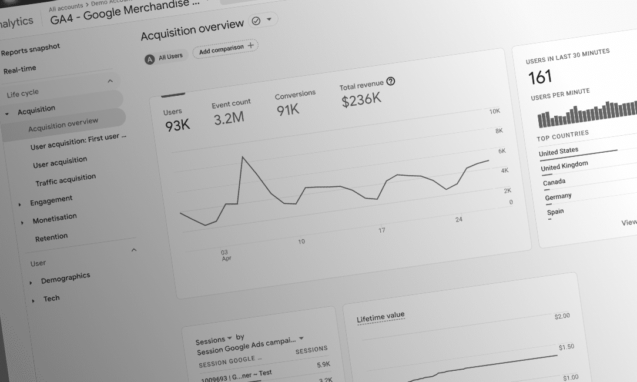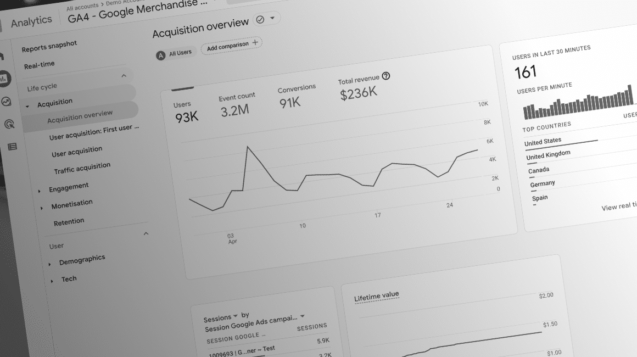They say that beauty is in the eye of the beholder, but in a world where everything can be measured using tools and data, subjectivity has lost some of its power. This is especially true for SEO content that’s designed to serve two very important purposes: to boost your organic search visibility (which is based on data-driven SEO techniques) and to interest your readers enough to move them to act (which is based on market research).

While the content itself can cover an infinite range of topics, a good content page is always hitting those two criteria.
Is your content getting any traffic? Does it serve any purpose other than show activity on your site?
In this post, we’re going to discuss what SEO content really is and what makes it good. Or, if you’re just here for the freebies like an audience member on Ellen, skip ahead to see what goodies are hiding under your seat.
What Is SEO Content?
Not everything on your website needs to be (or should be) optimised. For example, your Contact Us page is probably not the most appropriate URL on your website to rank on Google.
When we’re talking about SEO content, we’re quite simply referring to pages you want to rank. This includes blog posts, landing pages, white papers, or any page that’s been crafted around a keyword.
What Makes SEO Content Good?
What Makes SEO Content Good?
What makes your favourite book your favourite? Is it the prose—beautifully crafted sentences with delicious word choices that make you want to curl up inside the pages and take a long, satisfied nap? Or is the story itself—daring and adventurous characters that find themselves in perilous situations that they escape by the skin of their teeth? Or perhaps what makes it your favourite is simply how it makes you feel.
Your taste in literature is as subjective as your taste in art, but unlike books, your SEO content has an ulterior motive: to rank.
Is SEO Enough?
Yes, good content pages are well-written, typo-free, and organised on the page to make it easy for us lazy humans to scan. But it’s also written to answer a user’s search query. Basing your content around search intent gives you the best possible chance to rank.
Our On-Page SEO Best Practices guide shows you how to format a basic SEO page. But before you can get started, you’ll need to do keyword research and create a content brief with all the relevant information your writer needs to craft optimised content.
Learn how to create the best content briefs for your writers.
Is it Well-Written?
You’d think this was a given, but unfortunately, this point still needs to be addressed. Take a look at the highest-ranking pages on any given keyword, and you won’t find a content page that’s littered with spelling mistakes, stuffed with keywords, or devoid of headers.
You don’t have to be an English major to write well. But considering your page’s readability is a ranking factor, you shouldn’t let just anyone write your pages.
Is it Helpful, Reliable, and People-First Content?
(updated 10 July, 2023)
Recently, Google has changed its attitude toward AI-generated content. In the early days, when AI copy was just a wobbly, new-born colt learning to walk for the first time, it was being used by webmasters who uploaded bulk loads of content to their sites, regardless of its value.
Fast forward to ChatGPT, and suddenly AI-generated content isn’t actually half bad, and, since everyone was going to use it anyway, Google had to change its views about content generation, focusing instead on content quality.
More particularly, content helpfulness. So, if you’re using AI in lieu of an in-the-flesh writer, you better make sure that the content it generates is useful and credible (as in, you better be fact-checking those stats, queen). In other words, you really ought to give it a read-through before you make it live.
Here are the kind of questions Señor Google suggests you ask about your content:
- Does the main heading or page title avoid exaggerating or being shocking in nature?
- Is this the sort of page you'd want to bookmark, share with a friend, or recommend?
- Would you expect to see this content in or referenced by a printed magazine, encyclopaedia, or book?
- Does the content provide substantial value when compared to other pages in search results?
- Are you mainly summarising what others have to say without adding much value?
- Is the content primarily made to attract visits from search engines? (the answer should be no.
There’s a lot more to this conversation about what constitutes helpful content, and you can find more of these insightful questions on Google’s own page (linked above). The important takeaway is that you might want to think twice about posting a piece of content just for the sake of ranking for a keyword.
Now, more than ever, Google is cracking down on junk, so be mindful about what exactly your content is about, who it’s really for, and whether or not the reader has something positive to gain from reading it.
Download Our Content Grading System
If we haven’t said it enough, we’re going to say it again: good SEO content is vital to your brand’s online presence.
And now you can judge for yourself if your content is ready to post! Download our FREE content grading system to use before you go live with your next page.
















